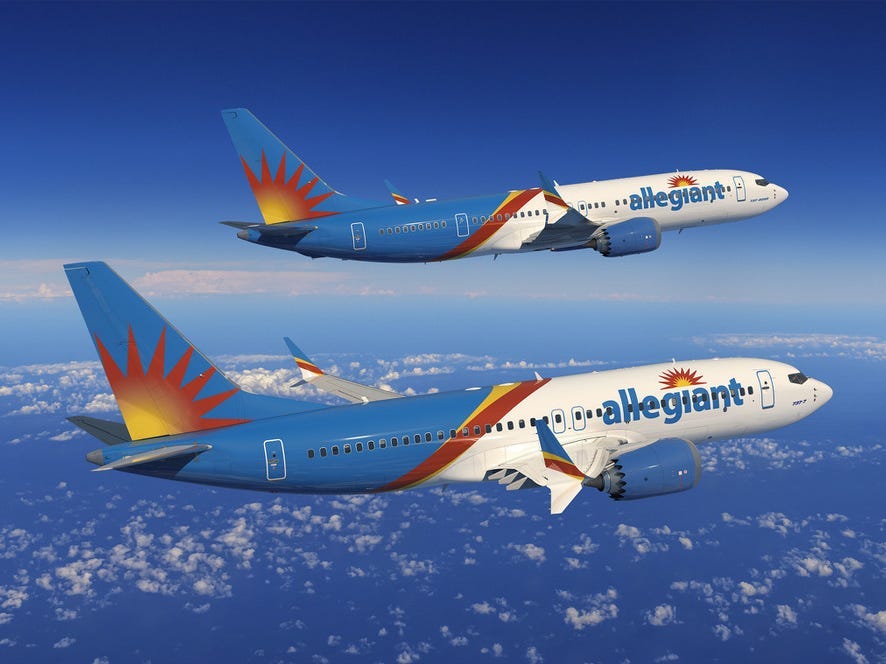
- Allegiant Air announced it has purchased 50 new Boeing 737 MAX jets to add to its all-Airbus fleet.
- The decision breaks from the typical low-cost business strategy of operating just one aircraft type.
- Industry expert Henry Harteveldt said the order makes sense because of the jet's operating capabilities.
Ultra-low-cost carrier Allegiant Air announced Wednesday that it is buying 50 new Boeing 737 MAX jets as it continues to modernize and grow its fleet.
Allegiant's multi-year deal with Boeing will see the delivery of 50 new MAX jets by 2025, including the 737-7 and 737-8-200 models, the carrier said in a press release. The deal also includes the option to buy 50 additional planes, which will put the airline in a favorable position for future growth, according to the company.
"Our approach to fleet has always been opportunistic, and this exciting transaction with Boeing is no exception," Allegiant CEO Maurice J. Gallagher, Jr. said. "While the heart of our strategy continues to center on previously-owned aircraft, the infusion of up to 100 direct-from-the-manufacturer 737s will bring numerous benefits for the future – including flexibility for capacity growth and aircraft retirements, significant environmental benefits, and modern configuration and cabin features our customers will appreciate."
The carrier explained the pandemic presented "unique opportunities to acquire new equipment." Henry Harteveldt, travel analyst and president of Atmosphere Research Group, told Insider Allegiant likely got a good deal on the planes and a faster delivery from Boeing than Airbus could promise.
Allegiant's MAX jets will feature Space Bins and Boeing's Sky Interior, offering more legroom, a more spacious cabin, and more seating capacity, as well as making the storing and retrieving of carry-on bags easier for travelers. Moreover, the jet will provide better efficiency, burning 20% less fuel than the older A320 family, according to the airline.
The company's historic order is the first-ever deal between Boeing and an ultra-low-cost carrier in the US, with deliveries scheduled to begin in 2023, according to the carrier. Currently, Allegiant operates an all-Airbus fleet consisting of the 75 A319 and A320s.
While switching to a mixed fleet is not a common business strategy for ultra-low-cost carriers, which typically only operate one aircraft type as a way to keep costs low, Allegiant said the addition of the MAX "will add significant economic and operational benefits for years to come."
Harteveldt explained that Allegiant's purchase of the MAX jet makes sense because of the plane's "impressive operating capabilities."
"If Allegiant wants, it can have its 737 Max jets certified for ETOPS operations, allowing the planes to fly more direct overwater routes that are further from land," he told Insider. This could allow Allegiant to launch new overwater routes to Hawaii or Latin America, as well as other longer routes over land."
Harteveldt also explained the 737-8-200 variant is ultra-high-density, giving Allegiant the ability to add more passenger capacity during peak-demand periods.
This is not the first time Allegiant has operated Boeing jets. In 2010, the carrier acquired six 757 single-aisle planes to fly to Hawaii, though demand waned and the aircraft proved too expensive to operate, so the type was retired in 2017, according to FlightGlobal.
The company also operated the MD80 twin-engine jet, but the aging fleet was officially retired in 2018 due to high oil prices and the aircraft's low fuel efficiency, leaving Allegiant with just Airbus planes.
While Allegiant has decided to once again operate a mixed fleet, other low-cost carriers have remained hesitant to introduce a new type. In March 2021, Southwest Airlines signed a deal with Boeing for 100 MAX 7 planes but had been weighing the option to buy the Airbus A220 instead, according to CNBC.
The company's COO Mike Van de Ven said at the time having multiple aircraft types would create issues with pilot training and maintenance, and the change would be "a big undertaking for us."